Search titles
Displaying results 1 to 10 of 86.

Deeper, Strategic Collaboration in the Securities Sector »
India and Australia
Authored by: Sonia Khosa
Publication date: 2025
Winner of ANU Press ECR Prize in Legal Scholarship
In an era of globalised finance and increasing cross-border activity, regulatory cooperation has become essential for market integrity and development. This book examines the potential for strategic collaboration between India and Australia in the securities sector—two nations with distinct but complementary economic and legal frameworks. Through a comparative analysis of the Securities and Exchange Board of India (SEBI) and the Australian Securities and Investments Commission (ASIC), it evaluates alignment with International Organization of Securities Commissions (IOSCO) principles, focusing on supervisory powers, enforcement mechanisms and compliance effectiveness. The analysis identifies shared regulatory goals and governance principles, highlighting opportunities for bilateral cooperation.
Offering a roadmap for capital market integration and regulatory innovation, the book makes a timely contribution to international financial scholarship. It delivers practical insights for policymakers, legal scholars and regulators interested in forging resilient cross-border partnerships—both within the Indo-Pacific and beyond.
Coming soon
Notify me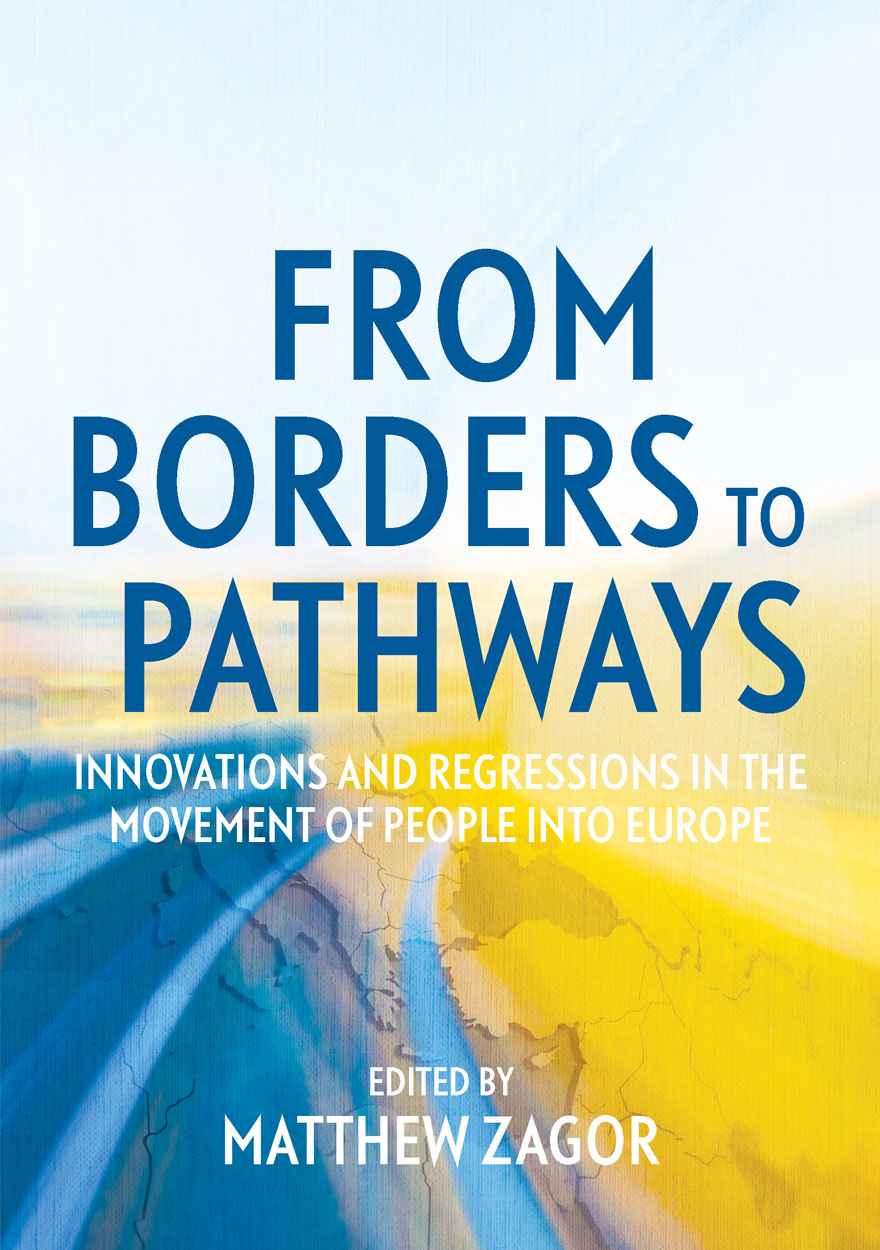
From Borders to Pathways »
Innovations and Regressions in the Movement of People into Europe
Edited by: Matthew Zagor
Publication date: September 2024
From Borders to Pathways: Innovations and Regressions in the Movement of People into Europe examines the evolution of European migration policy, offering a forward-looking analysis that extends beyond traditional border controls to innovative legal migration pathways. Contributors provide an in-depth exploration of the drivers shaping migration policies, including public opinion and the rise of populist discourses, the contrasting responses to various real and imagined migrant crises, and critiques of recent policy innovations such as refugee finance schemes, ‘safe legal pathways’, and migrant lotteries. Through interdisciplinary perspectives, the authors assess socio-political, legal, geo-political and cultural shifts to advocate for a more inclusive, humane and sustainable approach to migration. By challenging dominant narratives of deterrence, extraterritoriality and exclusion, this book advocates for policies that balance Europe’s myriad commitments, values and imperatives, highlighting the need for ethical frameworks that respect the dignity of migrants. Essential reading for policymakers, scholars and stakeholders, From Borders to Pathways offers a comprehensive reflection on the complexities of migration in Europe, signalling a paradigm shift towards cooperation, inclusivity, and shared responsibility in global mobility.
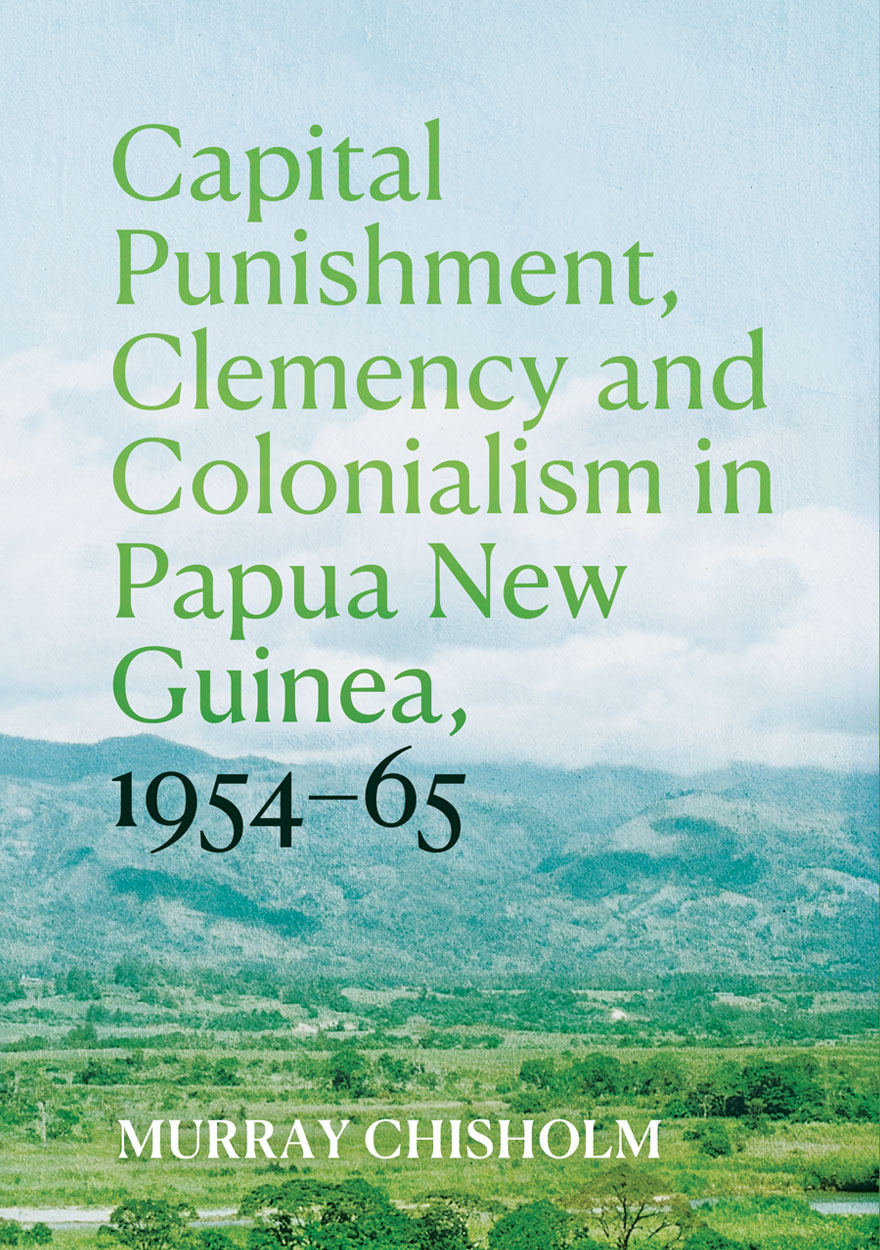
Capital Punishment, Clemency and Colonialism in Papua New Guinea, 1954–65 »
Authored by: Murray Chisholm
Publication date: July 2024
This study builds on a close examination of an archive of files that advised the Australian Commonwealth Executive on Papua New Guineans found guilty of capital offences in PNG between 1954 and 1965. These files provide telling insight into conceptions held by officials at different stages of the justice process into justice, savagery and civilisation, and colonialism and Australia’s role in the world. The particular combination of idealism and self-interest, liberalism and paternalism, and justice and authoritarianism axiomatic to Australian colonialism becomes apparent and enables discussion of Australia’s administration of PNG in the lead-up to the acceptance of independence as an immediate policy goal. The files show Australia gathering the authority to grant mercy into the hands of the Commonwealth and then devolving it back to the territories. In these transitions, the capital case review files show the trajectory of Australian colonialism during a period when the administration was unsure of the duration and nature of its future relationship with PNG.

Subjects and Aliens »
Histories of Nationality, Law and Belonging in Australia and New Zealand
Edited by: Kate Bagnall, Peter Prince
Publication date: August 2023
Subjects and Aliens confronts the problematic history of belonging in Australia and New Zealand. In both countries, race has often been more important than the law in determining who is considered ‘one of us’.
Each chapter in the collection highlights the lived experiences of people who negotiated laws and policies relating to nationality and citizenship rights in twentieth-century Australasia, including Chinese Australians enlisting during the First World War, Dalmatian gum-diggers turned farmers in New Zealand, Indians in 1920s Australia arguing for their citizenship rights, and Australian women who lost their nationality after marrying non-British subjects.
The book also considers how the legal belonging—and accompanying rights and protections—of First Nations people has been denied, despite the High Court of Australia’s recent assertion (in the landmark Love & Thoms case of 2020) that Aboriginal people have never been considered ‘aliens’ or ‘foreigners’ since 1788. The experiences of world-famous artist Albert Namatjira, and of those made to apply for ‘certificates of citizenship’ under Western Australian law, suggest otherwise.
Subjects and Aliens demonstrates how people who legally belonged were denied rights and protections as citizens through the actions of those who created, administered and interpreted the law across the twentieth century, and how the legal ramifications of those actions can still be felt today.
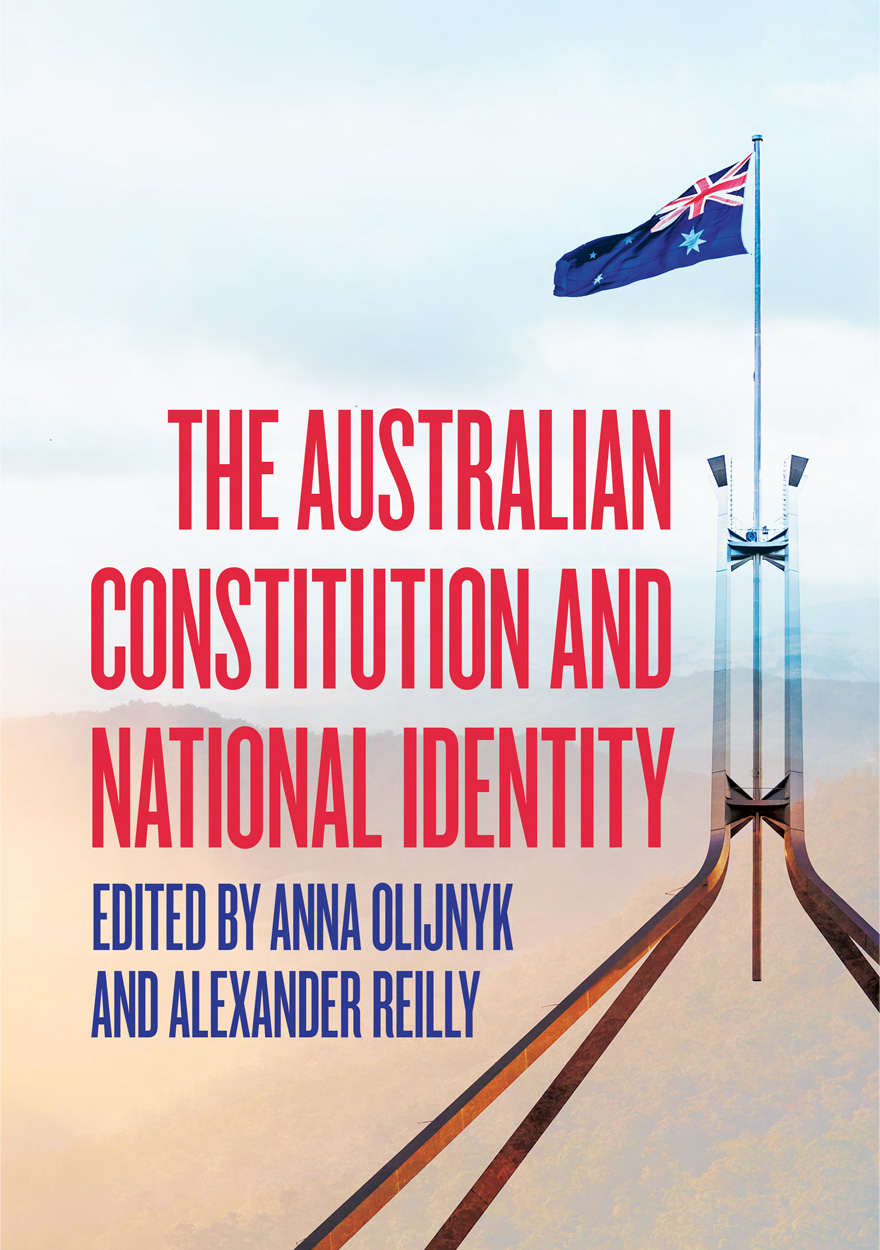
The Australian Constitution and National Identity »
Edited by: Anna Olijnyk, Alexander Reilly
Publication date: May 2023
What does Australia’s Constitution say about national identity? A conventional answer might be ‘not much’. Yet recent constitutional controversies raise issues about the recognition of First Peoples, the place of migrants and dual citizens, the right to free speech, the nature of our democracy, and our continuing connection to the British monarchy. These are constitutional questions, but they are also questions about who we are as a nation.
This edited collection brings together legal, historical, and political science scholarship. These diverse perspectives reveal a wealth of connections between the Australian Constitution and Australia’s national identity.
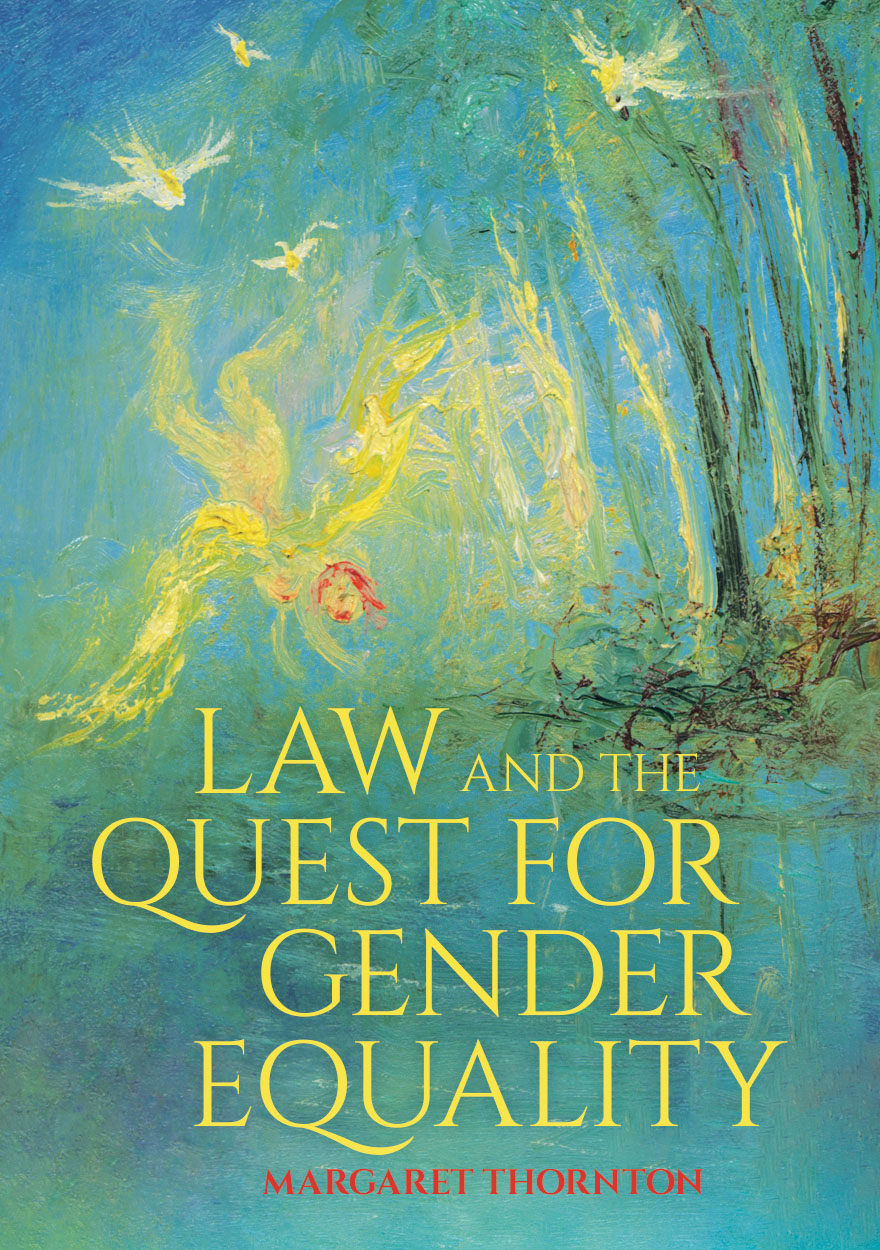
Law and the Quest for Gender Equality »
Authored by: Margaret Thornton
Publication date: April 2023
For centuries, law was used to subordinate women and exclude them from the public sphere, so it cannot be expected to become a source of equality instantaneously or without resistance from benchmark men—that is, those who are white, heterosexual, able-bodied and middle class. Equality, furthermore, was attainable only in the public sphere, whereas the private sphere was marked as a site of inequality; a wife, children and servants could never be the equals of the master. Despite their ambivalence about the role of law and its contradictions, women and Others felt that they had no alternative but to look to it as a means of liberation.
This skewed patriarchal heritage, the subtext of this collection of essays, has continued to impede the quest for equality by women and Others. It informs not only gender relations in the private sphere, as illustrated by domestic violence and sexual assault, but also the status of women in the public sphere. Despite the fact that women have entered the paid workforce—including the professions—in large numbers, they are still expected to assume responsibility for the preponderance of society’s caring. The essays show how maternal and caring roles, which are still largely viewed as belonging to an unregulated private sphere, continue to be invoked to detract from the authority of the feminine in the public sphere. The promise of antidiscrimination legislation in overcoming the heritage of the past is also shown to be somewhat hollow.

Voluntary Assisted Dying »
Law? Health? Justice?
Edited by: Daniel J Fleming, David J Carter
Publication date: February 2022
Since the introduction of voluntary assisted dying in 2019, a ‘new moment’ in the governance of life and death has opened up within the Australian context. This new moment demands new questions be asked regarding the regime and its effects in this new era for law, health care and justice.
This collection brings together critical perspectives on voluntary assisted dying itself, and on various practices adjacent to it, including questions of state power, population ageing, the differential treatment of human and non-human animals at the time of death, the management of health care processes through silent ‘workarounds’, and the financialisation of death.
This book provides an overview of the first Australian regime, and then introduces these diverse critical views, broadening our engagement with euthanasia and voluntary assisted dying beyond the limited, but important, debates about law reform and its particular enactment in Australia.

Macrocriminology and Freedom »
Authored by: John Braithwaite
Publication date: February 2022
How can power over others be transformed to ‘power with’? It is possible to transform many institutions to build societies with less predation and more freedom. These stretch from families and institutions of gender to the United Nations. Some societies, times and places have crime rates a hundred times higher than others. Some police forces kill at a hundred times the rate of others. Some criminal corporations kill thousands more than others. Micro variables fail to explain these patterns. Prevention principles for that challenge are macrocriminological.
Freedom is conceived in a republican way as non-domination. Tempering domination prevents crime; crime prevention reduces domination. Many believe a high crime rate is a price of freedom. Not Braithwaite. His principles of crime control are to build freedom, temper power, lift people from poverty and reduce all forms of domination. Freedom requires a more just normative order. It requires cascading of peace by social movements for non-violence and non-domination. Periods of war, domination and anomie cascade with long lags to elevated crime, violence, inter-generational self-violence and ecocide. Cybercrime today poses risks of anomic nuclear wars.
Braithwaite’s proposals refine some of criminology’s central theories and sharpen their relevance to all varieties of freedom. They can be reduced to one sentence. Strengthen freedom to prevent crime, prevent crime to strengthen freedom.
‘A true magnum opus, Macrocriminology and Freedom is a thought provoking and generative book from one of criminology’s intellectual giants. John Braithwaite reaches far and wide across societies, time, and disciplines to advance no less than a theory of how to build a society that simultaneously reduces both domination and crime. His ambitious ideas on cascades of non-dominating collective efficacy and crime prevention, for example, and their connections to social movements and political freedom, go well beyond usual criminological discourse. Chock full of theoretical propositions and bold insights, this a book that will keep criminologists busy for years. Macrocriminology and Freedom should not just be read, but better yet, savoured.’
– Robert J. Sampson, Henry Ford II Professor of the Social Sciences, Harvard University
‘In this majestic theorisation of the relationship between crime and freedom John Braithwaite isolates the unique power of macrocriminology as a lens through which to comprehend and challenge many of the fundamental crises facing our planet. Very few scholars have the breadth and overview to succeed in a mission of this order … Braithwaite does. This extraordinary book is an object lesson for all who seek to understand and resist domination and the crimes of power that flow from it.’
– Penny Green, Professor of Law and Globalisation, Queen Mary University of London
‘For over 40 years, John Braithwaite has been a voice of wisdom, hope and humanity in criminology. This dazzling new book weaves together all the main themes of his influential work, reanimating many of the core concepts of the discipline, as well as incorporating interdisciplinary resources from south and north, east and west, to produce an elegant and ambitious explanatory and normative account of crime as freedom-threatening domination. Decentring criminal justice as the solution to crime, Braithwaite shows that, on a global scale, the aspiration to tackle crimes, ranging from interpersonal violence through corporate crimes to ecocide, lies in the development of freedom-enhancing, power-tempering institutions in the political, economic and social spheres.’
– Nicola Lacey, Professor of Law, Gender and Social Policy, London School of Economics
‘Macrocriminology and Freedom is a criminological epic, an expansive and erudite story that sweeps across history and contexts. The book is frightening in showing how cascading events can produce catastrophes from crime to environmental destruction. But in the end, its message is hopeful, identifying pathways—or “normative rivers”—for guiding freedom from domination and crime. Drawing on his distinguished career, John Braithwaite has bestowed an extraordinary gift—a book, like other masterpieces, that will yield special insights each time we take an excursion through its pages.’
– Francis T. Cullen, Distinguished Research Professor Emeritus, University of Cincinnati
‘In this engaging book John Braithwaite reinvigorates discussions about crime and its control. While advocating a macro approach, the book is punctuated not only with insights and data from smaller-scale studies conducted in a range of jurisdictions, but also with auto-biographical vignettes. The effect creates a deeply personal account of the perils of state, non-state and market violence and authoritarianism and the potential and indeed duty, of criminologists to work towards their reduction, by refocusing their efforts on explaining and tackling crime in its myriad of forms.’
– Mary Bosworth, Professor of Criminology, University of Oxford and Monash University
‘John Braithwaite has had a unique influence on criminology globally. In this encyclopaedic text he synthesises a wealth of criminological knowledge, particularly in the sphere of anomie theory, into broader debates about the nature of domination and freedom in contemporary society. He defends the relevance of criminological theory, while urging criminology to be activist rather than reactive and technocratic, counter-hegemonic rather than neutral. Not for the first time, John Braithwaite has challenged criminologists to construct theories that cut across micro and macro structures. This book will stir debate. It deserves a broad readership.’
– Harry Blagg, Professor of Criminology, University of Western Australia
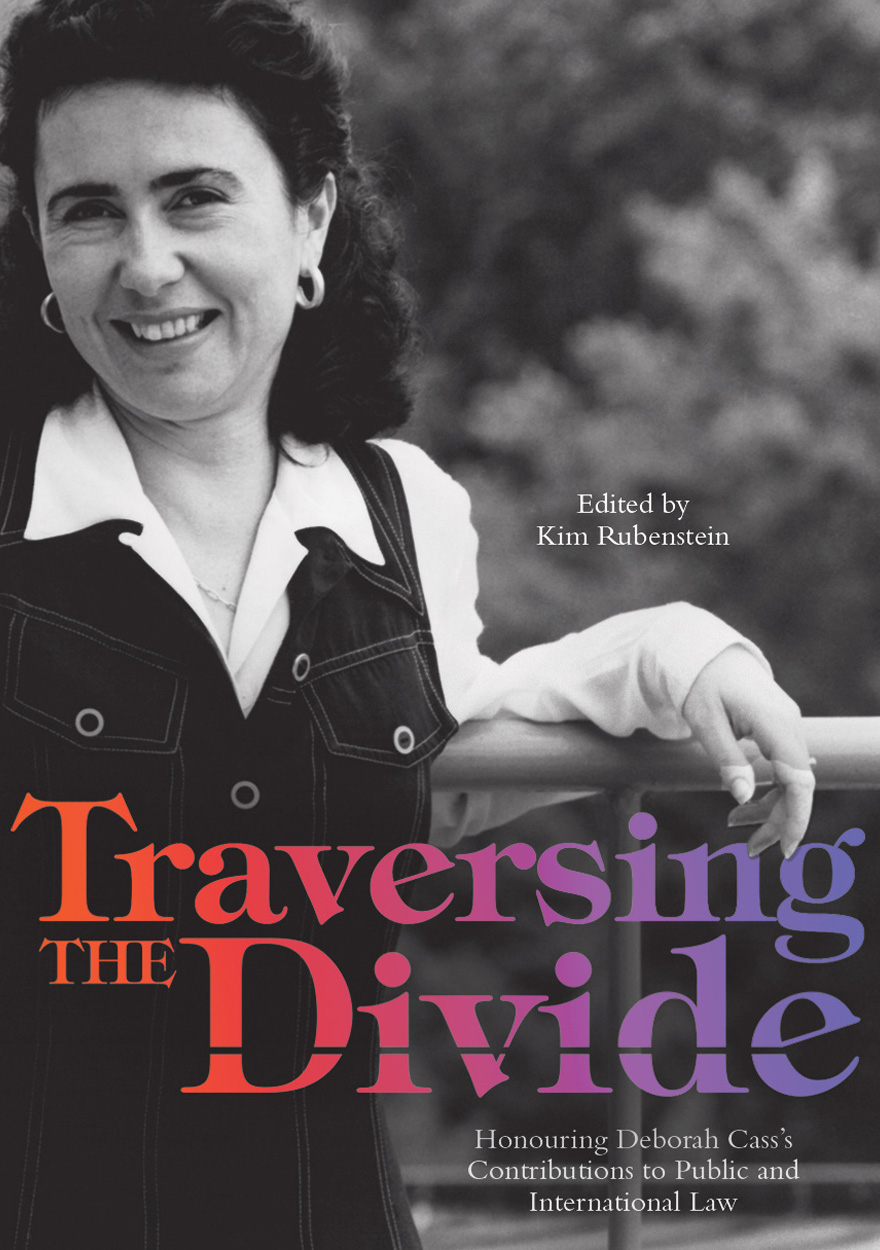
Traversing the Divide »
Honouring Deborah Cass’s Contributions to Public and International Law
Edited by: Kim Rubenstein
Publication date: March 2021
‘While devoting fine attention to the stuff of everyday life, Deborah Cass was also a brilliant scholar. Although the deep sense of loss and sadness at Deborah’s death remains, it is wonderful to have her writings as a continuing source of inspiration and consolation. In them, we continue to hear Deborah’s firm, clear voice, her appreciation of language, her seriousness, her curiosity, her sensitivity and her wry humour.’
—Professor Hilary Charlesworth
This collection honours the work of Deborah Cass, 15 February 1960 – 4 June 2013, a brilliant Australian constitutional and international lawyer. Deborah studied at the University of Melbourne and Harvard Law School and taught at Melbourne Law School, The Australian National University and the London School of Economics. A member of The Australian National University’s Centre for International and Public Law from 1993 to 2000, Deborah’s work offered illuminating new perspectives in a range of fields, from the right to self-determination, critical international legal theory, and feminist legal theory to the international trade law system. The title of this edited collection draws on one of her articles, ‘Traversing the Divide: International Law and Australian Constitutional Law’ (1998) 20 Adelaide Law Review 73. This book evolves from a symposium held to draw together academics from around the globe to reflect on Deborah’s extensive scholarship and contributions to public law and international law, and to examine how her work is of value to current domestic and international law issues. The pieces selected for this volume both remind us of Deborah’s outstanding academic career and provide important insights on current public law and international law pressing issues.

Towards Human Rights Compliance in Australian Prisons »
Authored by: Anita Mackay
Publication date: November 2020
Imprisoned people have always been vulnerable and in need of human rights protections. The slow but steady growth in the protection of imprisoned people’s rights over recent decades in Australia has mostly come from incremental change to prison legislation and common law principles. A radical influence is about to disrupt this slow change.
Australian prisons and other closed environments will soon be subject to international inspections by the United Nations Subcommittee on the Prevention of Torture (SPT). This is because the Australian Government ratified the Optional Protocol to the Convention Against Torture and other Cruel, Inhuman or Degrading Treatment or Punishment (OPCAT) in December 2017.
Australia’s international human rights law obligations as they apply to prisons are complex and stem from multiple Treaties. This book distils these obligations into five prerequisites for compliance, consistent with the preventive focus of the OPCAT. They are:
reduce reliance on imprisonment
align domestic legislation with Australia’s international human rights law obligations
shift the focus of imprisonment to the goal of rehabilitation and restoration
support prison staff to treat imprisoned people in a human rights–consistent manner
ensure decent physical conditions in all prisons.
Attention to each of these five areas will help all levels of Australian government and prison managers take the steps required to move towards compliance. Human-rights led prison reform is necessary both to improve the lives of imprisoned people and for Australia to achieve compliance with the international human rights legal obligations to which it has voluntarily committed itself.
Awarded the 2021 Australian and New Zealand Society of Criminology (ANZSOC) Christine M Alder book award for ‘an outstanding monograph or book which, in the opinion of the judges, has made a valuable and outstanding contribution to criminology’.



